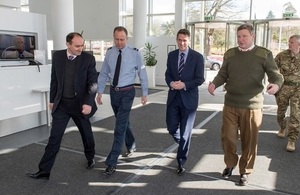Defence Secretary Gavin Williamson visits Joint Forces Command
Commander Joint Forces Command, General Sir Chris Deverell hosted the Defence Secretary, Gavin Williamson, on a visit to Joint Forces Command (JFC) on Monday 26 February.

General Sir Chris Deverell KCB MBE ADC Gen Commander Joint Forces Command meets with Secretary of State for Defence Gavin Williamson CBE at Northwood HQ Photo: Crown copyright. all rights reserved
The Secretary of State travelled to Defence Intelligence at Wyton and the Permanent Joint Headquarters at Northwood, gaining first hand insight into these organisations, their place within JFC, and how they support the defence of the nation.
At the Pathfinder Building in Wyton, the headquarters of the Joint Force Intelligence Group (JFIG), the Defence Secretary met with Deputy Chief of Defence Intelligence, Paul Rimmer, Commander Cyber and Intelligence, Surveillance and Reconnaissance, Air Vice Marshal Ian Vallely, and Commander JFIG, Brigadier Ben Kyte.
Secretary of State saw how all aspects of Defence Intelligence are coordinated to provide the understanding he and others in government need to make decisions. Operators briefed him on, amongst other things, Cyber, Geospatial Intelligence, and what is known as Time Dominant Analysis; the continual process for providing rapid analytical response to events through the fusion of classified and open source information.
Commander JFC then accompanied the Defence Secretary to Northwood Headquarters, where he toured the Permanent Joint Headquarters (PJHQ). Over a working lunch with the Chief of Staff (COS) Policy and Finance, Paul Wyatt, and COS Operations, Air Vice Marshal Gary Waterfall, he heard about the history of PJHQ and how it fits into today’s operating environment, in support of MOD Head Office and other government departments.
This discussion covered the high number of operations being conducted by UK forces, with coalition partners, around the globe, and the significant range of contingency plans that are maintained by PJHQ.
The Defence Secretary also met PJHQ staff in the Operations Control Room, hearing from planners about how they ensure that the UK Armed Forces are readied for operations, and from operators on how events are managed on a 24 hours a day, 7 days a week basis.
Topics included Op Ruman, the UK’s rapid response following the hurricanes in the Caribbean towards the end of last year, and Op Trenton, the UK’s contribution to the United Nations Mission in South Sudan (UNMISS), both superb examples of what the 3 UK armed forces can do when operating jointly.
Commander JFC and the Defence Secretary also discussed the role of JFC and its strategy, the guiding principle of which is to secure advantage for the joint force through innovation, integration and information. With his focus on modernising defence, the Secretary of State was particularly interested in the steps JFC is taking to make innovation happen in JFC, the role that the command plays in integrating the capabilities available to defence, and the digital acceleration that the command is in the process of delivering, through Miltech.
The Defence Secretary said of his visit:
I thoroughly enjoyed visiting Joint Forces Command earlier this week. Organisations like the Joint Force Intelligence Group and the Permanent Joint Headquarters are a big part of the reason why the UK’s armed forces make such a significant contribution to the defence of the nation, and our allies, in difficult and demanding circumstances around the globe.
Commander JFC also commented:
It was a great pleasure to host the Defence Secretary, Gavin Williamson, at Wyton and Northwood, where he had the opportunity to meet some of the superb people who work tirelessly to provide intelligence for defence and command UK armed forces on operations.
His visit also allowed us to showcase the work Joint Forces Command is doing to secure advantage, through innovation, integration and information, and thereby contribute to modernising defence.